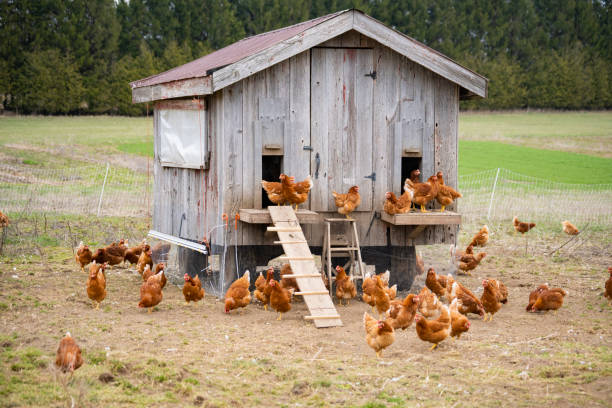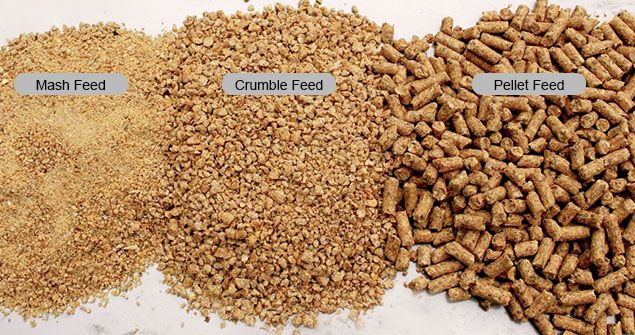Last updated on November 13th, 2024 at 03:35 pm
Introduction to Kienyeji Chicken Farming
Kienyeji chickens, also known as indigenous or traditional chicken breeds, have been reared in rural Kenya for centuries.
With their hardy nature and ability to thrive on minimal inputs, these feathered friends present an exciting opportunity for smallholder farmers seeking a sustainable income source.
Kienyeji chicken farming has gained significant traction in recent years, driven by the growing demand for organic, free-range poultry products.
These chickens are renowned for their distinctive taste, leaner meat, and higher nutritional value compared to commercial broilers.
Here are a few reasons why Kienyeji chicken farming is an attractive venture:
- Low Initial Investment: Kienyeji chickens are relatively inexpensive to acquire, and their housing requirements are minimal, making it an accessible business for those with limited capital.
- Dual Purpose: These chickens serve a dual purpose, providing both meat and eggs, ensuring a steady income stream.
- Minimal Inputs: Kienyeji chickens are resilient and can thrive on locally available feed sources, reducing the dependence on expensive commercial feeds.
- Organic and Free-Range: With their free-range nature and organic diet, Kienyeji chickens produce highly sought-after organic products, catering to the growing health-conscious market.
As the demand for locally-sourced, sustainable, and ethical poultry products continues to rise, the Kienyeji chicken farming business presents a promising opportunity for entrepreneurial farmers in Kenya.
Benefits of Rearing Kienyeji Chickens
Embarking on a Kienyeji chicken rearing business offers a myriad of advantages that extend beyond just financial gains.
These hardy, indigenous birds have been an integral part of Kenyan rural communities for generations, and their numerous benefits make them an excellent choice for small-scale farmers seeking a sustainable and rewarding enterprise.
- Low Investment and Operational Costs
One of the primary advantages of rearing Kienyeji chickens is the relatively low initial investment required.
Unlike commercial poultry operations, which demand substantial capital for infrastructure and equipment, Kienyeji chickens can thrive in simple, low-cost housing structures made from locally available materials.
Additionally, their ability to forage for a significant portion of their diet reduces the reliance on expensive commercial feeds, further lowering operational costs.
This cost-effective nature makes Kienyeji chicken farming accessible to farmers with limited financial resources.
- Resilience and Adaptability
Kienyeji chickens are well-adapted to the local climate and environmental conditions, making them incredibly resilient.
Their hardy nature allows them to withstand various challenges, such as disease outbreaks, extreme weather conditions, and limited access to veterinary care, which can be detrimental to commercial poultry breeds.
This resilience translates into lower mortality rates and reduced expenses associated with disease management and medication, ultimately improving profitability for the farmer.
- High-Quality Organic Products
With their free-range lifestyle and organic diet, Kienyeji chickens produce high-quality, organic eggs and meat that are increasingly sought after by health-conscious consumers.
These products are known for their superior taste, higher nutritional value, and lack of antibiotics or growth hormones.
Kienyeji chicken farmers can significantly boost their profits by capitalizing on the skyrocketing demand for organic and ethically-raised poultry products and commanding premium prices for their produce.
- Diversification and Risk Mitigation
Rearing Kienyeji chickens offers an excellent opportunity for smallholder farmers to diversify their income streams.
Farmers can mitigate the risks associated with relying on a single crop or livestock venture by integrating this enterprise with their existing agricultural activities.
This diversification not only provides a safety net during periods of crop failure or market volatility but also contributes to overall household food security and income stability.
- Environmental Sustainability
Kienyeji chicken farming is an environmentally sustainable practice.
These birds can thrive on locally available feed sources, such as kitchen scraps, insects, and vegetation, reducing the need for resource-intensive commercial feed production.
Additionally, their free-range nature allows for natural fertilization of the land, contributing to soil fertility and promoting a healthier ecosystem.
This aligns with the growing global emphasis on sustainable agricultural practices and environmental conservation.
- Preservation of Cultural Heritage
Kienyeji chickens hold significant cultural and traditional value in Kenyan communities.
Rearing these indigenous breeds helps preserve the rich genetic diversity and cultural heritage associated with traditional poultry farming practices.
Getting Started – Housing and Breed Selection

Embarking on a Kienyeji chicken rearing business requires careful planning and preparation, particularly when it comes to housing and breed selection.
These two factors play a crucial role in ensuring the health, productivity, and overall success of your venture. Let’s delve into the essential considerations for each aspect.
Housing and Shelter
Providing proper housing for your Kienyeji chickens is essential for their well-being and optimal performance. While these hardy birds can thrive in simple conditions, it’s important to create a comfortable and secure environment that meets their basic needs.
Types of Housing
- Free-Range System: This approach allows your chickens to roam freely during the day while providing a secure shelter for them to roost at night. Simple structures made from locally available materials like wood, mud, or thatch can serve as suitable night shelters.
- Semi-Intensive System: This system combines a sheltered housing area with an outdoor run or yard. The chickens can move freely between the two spaces, providing them with the benefits of both confinement and free-range foraging.
- Deep Litter System: In this system, the chickens are confined to a well-ventilated housing structure with a deep litter of absorbent materials like wood shavings or dried grass. The litter serves as a source of food and insulation, and it also helps to control moisture and odor.
Housing Requirements
Regardless of the housing system you choose, there are a few essential requirements to consider:
- Space: Provide ample space for your chickens to move around freely, with a minimum of 0.5 square meters per bird for optimal health and productivity.
- Ventilation: Ensure proper ventilation to maintain optimal air quality and prevent the buildup of ammonia and other harmful gases.
- Nesting Boxes: Provide one nesting box for every 4-5 hens to encourage egg-laying and prevent egg-eating behavior.
- Perches: Install perches at different heights to allow your chickens to roost comfortably at night.
- Predator Protection: Implement measures to protect your flock from potential predators, such as secure fencing, elevated housing, or guarding dogs.
Breed Selection

Choosing the right Kienyeji chicken breed is crucial for the success of your business. Different breeds exhibit varying characteristics in terms of egg production, meat quality, disease resistance, and adaptability to local conditions.
Popular Kienyeji Chicken Breeds
- Original Kienyeji: This is the pure breed of indigenous chicken, unadulterated by research, known for being resistant to diseases and laying an average of 3 to 10 eggs a month with a maturity period of six months.
- Kenbro: Produced by Kenchic Limited, Kenbro chickens are heavy feeders, lay around 20 to 25 eggs a month, and have a maturity period of 4 to 5 months.
- Kari Improved Kienyeji: Developed by the Kenya Agricultural & Livestock Research Organization (KALRO), these chickens are a result of breeding different types of indigenous chickens in Kenya, known for high egg production, faster growth, and good feed-to-meat conversion. They lay around 15-20 eggs a month and mature faster, weighing approximately 1.2kg at four months.
- Rainbow Rooster: This breed is an improved indigenous chicken resulting from Indian research, known for laying between 20 to 25 eggs a month with a maturity period of 4 months. They are medium feeders with low resistance to diseases.
- Kuroiler: Developed in India by Kegg Farms Limited, Kuroiler chickens are medium feeders, lay between 18 to 20 eggs a month, and have low resistance to diseases. They are known for their unique traits and characteristics.
When selecting breeds, consider factors such as your target market (eggs or meat), local climatic conditions, and disease prevalence in your area. It’s also advisable to maintain a diverse gene pool by rearing multiple breeds to improve resilience and adaptability.
Sourcing Kienyeji Chickens
You can source Kienyeji chickens from local breeders, markets, or agricultural extension services. When purchasing, look for healthy, active birds with bright eyes, clean feathers, and no visible signs of disease or parasites.
It’s also recommended to quarantine new additions to your flock for at least two weeks to monitor for any potential health issues before introducing them to your existing birds.
Feeding and Nutrition for Kienyeji Chickens

Proper nutrition is essential for the health, productivity, and overall well-being of your Kienyeji chicken flock. These hardy birds have unique dietary requirements that must be met to ensure optimal growth, egg production, and disease resistance. Let’s explore the key aspects of feeding and nutrition for successful Kienyeji chicken rearing.
Feed Sources
Kienyeji chickens are known for their ability to forage and thrive on a variety of locally available feed sources. While this reduces reliance on expensive commercial feeds, it’s crucial to provide a balanced and nutritious diet to support their growth and production.
On-Farm Feed Sources
- Kitchen Scraps: Vegetable peels, leftover grains, and other food waste can be an excellent source of nutrients for your flock.
- Forage and Greens: Allow your chickens to roam and forage for insects, seeds, and green vegetation, which provide essential proteins, vitamins, and minerals.
- Crop Residues: Leftover stalks, leaves, and grains from your farm can be used as supplementary feed.
Commercial Feeds
While Kienyeji chickens can thrive on local feed sources, incorporating a balanced commercial feed can help ensure they receive all the necessary nutrients. Consider using the following:
- Grower Feed: Formulated for growing chicks, this feed provides the right balance of proteins, fats, vitamins, and minerals for proper development.
- Layer Feed: Designed for egg-laying hens, this feed contains higher levels of calcium and other nutrients essential for optimal egg production.
Commercial feeds should be used as a supplement to the on-farm feed sources, not as a complete replacement.
Feeding Practices
To ensure your chickens receive the proper nutrition, follow these best practices:
- Free-Range Feeding: Allow your chickens to roam and forage during the day, supplementing with commercial feed in the morning and evening.
- Feeding Schedule: Establish a consistent feeding schedule to encourage good feeding habits and prevent waste.
- Fresh Water: Provide clean, fresh water at all times to support digestion and overall health.
- Grit and Calcium Sources: Offer crushed oyster shells or limestone as a source of calcium for strong eggshells, and grit (coarse sand or gravel) to aid in digestion.
Nutritional Requirements
The specific nutritional requirements of your Kienyeji chickens will vary depending on their age, breed, and production stage. However, here are some general guidelines:
| Nutrient | Chicks (0-8 weeks) | Growers (9-20 weeks) | Layers | Breeders |
|---|---|---|---|---|
| Crude Protein | 18-20% | 14-16% | 16-18% | 16-18% |
| Metabolizable Energy | 2800-3000 kcal/kg | 2700-2900 kcal/kg | 2700-2800 kcal/kg | 2700-2800 kcal/kg |
| Calcium | 0.9-1.2% | 0.8-1.0% | 3.5-4.5% | 3.5-4.5% |
| Phosphorus | 0.6-0.8% | 0.5-0.7% | 0.6-0.8% | 0.6-0.8% |
Regular monitoring and adjustments to the feed ration may be necessary to ensure your flock’s specific nutritional needs are met.
Health Management and Biosecurity
Maintaining the health and well-being of your Kienyeji chicken flock is paramount to the success of your poultry rearing business.
These hardy birds are generally resilient, but they can still be susceptible to various diseases and health challenges.
Implementing proper biosecurity measures and health management practices is crucial to prevent disease outbreaks, minimize losses, and ensure optimal productivity.
Biosecurity Measures
Biosecurity refers to the preventive measures taken to reduce the risk of disease transmission and protect your flock from potential pathogens. Here are some essential biosecurity practices to implement:
Quarantine and Isolation
- Quarantine New Arrivals: Quarantine any new birds or those returning from shows or exhibitions for at least 2-3 weeks before introducing them to your existing flock. This allows you to monitor for signs of illness and prevent the spread of diseases.
- Isolation of Sick Birds: Promptly isolate any sick or injured birds from the rest of the flock to prevent disease transmission and provide appropriate treatment.
Sanitation and Disinfection
- Regular Cleaning: Frequently clean and disinfect housing areas, feeders, and water containers to minimize the buildup of bacteria, viruses, and parasites.
- Footbaths and Visitor Protocols: Implement footbaths at the entrance of your poultry house and require visitors to follow strict biosecurity protocols, such as wearing clean protective gear and avoiding contact with other flocks.
Rodent and Pest Control
- Rodent Control: Rodents can carry and transmit diseases to your flock. Implement effective rodent control measures, such as traps and bait stations, to minimize their presence.
- Pest Management: Insect pests like mites, lice, and flies can also transmit diseases and cause stress to your chickens. Regularly inspect and treat your flock for these pests using safe and approved methods.
Health Management Practices
In addition to biosecurity measures, implementing effective health management practices is crucial for maintaining a healthy and productive flock. Here are some key practices to consider:
Vaccination
- Routine Vaccinations: Consult with a veterinarian or local extension services to determine the appropriate vaccination schedule for your flock, based on the prevalent diseases in your area.
- Record Keeping: Maintain accurate records of vaccinations, treatments, and any health issues to track your flock’s health history and make informed decisions.
Nutrition and Husbandry
- Balanced Diet: Provide a balanced and nutritious diet to support your chickens’ overall health and immune system function.
- Clean Water Supply: Ensure a constant supply of clean, fresh water to prevent dehydration and potential health issues.
- Proper Housing: Maintain clean, well-ventilated housing conditions to reduce stress and the risk of disease transmission.
Regular Monitoring
- Daily Observations: Regularly observe your flock for any signs of illness, such as lethargy, reduced appetite, or abnormal droppings. Early detection is key to effective treatment and preventing further spread.
- Veterinary Consultation: Establish a relationship with a local veterinarian or poultry specialist who can provide guidance on disease prevention, treatment, and overall flock management.
Marketing and Profitability Analysis
Successful poultry rearing businesses not only require sound management practices but also a well-thought-out marketing strategy and profitability analysis.
With a thorough understanding of your target market, the development of powerful marketing channels and a meticulous analysis of your costs and revenue streams, you can confidently position your Kienyeji chicken farming venture for long-term success.
Market Analysis
Before diving into marketing strategies, it’s essential to understand your target market and its preferences. Conduct thorough market research to identify the potential customers for your Kienyeji chicken products and their specific needs and preferences.
Target Market Segments
- Local Markets: Explore opportunities in your local community, such as selling directly to households, restaurants, or small grocery stores that value locally sourced, organic poultry products.
- Urban Markets: As interest in organic and free-range poultry grows, there may be opportunities to tap into urban markets through farmers’ markets, specialty stores, or online platforms.
- Institutional Buyers: Consider targeting institutional buyers like schools, hospitals, or catering services that prioritize sourcing locally grown, high-quality poultry products.
Product Differentiation
Kienyeji chickens offer a unique selling point – their organic, free-range, and highly nutritious meat and eggs.
Emphasize these qualities to differentiate your products from commercially produced poultry.
Highlight the superior taste, higher nutritional value, and ethical production methods to appeal to health-conscious and environmentally-aware consumers.
Marketing Strategies
Once you’ve identified your target market, develop an effective marketing strategy to reach and engage potential customers. Here are some marketing channels to consider:
- Direct Sales: Establish a farm store or participate in local farmers’ markets to sell your products directly to consumers.
- Online Presence: Develop a website or leverage social media platforms to promote your business, showcase your products, and reach a wider audience.
- Partnerships and Collaborations: Explore partnerships with local restaurants, grocery stores, or community-supported agriculture (CSA) programs to distribute your products.
- Branding and Packaging: Invest in attractive and informative branding and packaging to enhance the appeal and perceived value of your Kienyeji chicken products.
Profitability Analysis
To ensure the long-term viability of your business, it’s crucial to conduct a thorough profitability analysis. This involves carefully evaluating your costs, revenue streams, and potential profits.
Cost Analysis
- Start-up Costs: Consider the initial investment required for housing, equipment, breeding stock, and any necessary permits or licenses.
- Operational Costs: Calculate ongoing costs such as feed, utilities, labor, veterinary care, and marketing expenses.
- Fixed and Variable Costs: Identify fixed costs (e.g., rent, insurance) and variable costs (e.g., feed, electricity) to better manage your expenses.
Revenue Streams
- Product Sales: Estimate potential revenue from selling meat, eggs, and live birds, considering factors like production levels, market prices, and demand.
- Value-Added Products: Explore opportunities to generate additional revenue by offering value-added products like processed meats, ready-to-cook meals, or fertilizers from chicken manure.
- Diversification: Consider diversifying your revenue streams by offering agritourism experiences, educational tours, or other complementary services.
Profit Projections
- Break-Even Analysis: Determine the production level and sales volume required to cover your costs and reach the break-even point.
- Profitability Scenarios: Create different profitability scenarios based on varying production levels, market prices, and cost assumptions to identify potential risks and opportunities.
- Cash Flow Management: Develop a cash flow projection to ensure sufficient funds for ongoing operations and future investments.
To position your Kienyeji chicken rearing business for success, it’s important to conduct thorough market analysis, implement effective marketing strategies, and carefully evaluate your profitability.
Continuously monitor and adjust your strategies based on market trends, customer feedback, and financial performance to maximize profitability and sustainability.
Key Takeaways
- Low Investment and Operational Costs: Kienyeji chickens require minimal initial investment and can thrive on locally available feed sources, reducing operational costs compared to commercial poultry operations.
- Hardy and Resilient: These indigenous breeds are well-adapted to local climate conditions and are more resilient to diseases and environmental challenges, resulting in lower mortality rates.
- High-Quality Organic Products: With their free-range lifestyle and organic diet, Kienyeji chickens produce superior-tasting, highly nutritious, and sought-after organic eggs and meat.
- Income Diversification: Rearing Kienyeji chickens offers smallholder farmers an opportunity to diversify their income streams and mitigate risks associated with relying on a single agricultural venture.
- Environmental Sustainability: Kienyeji chicken farming promotes environmental sustainability through reduced resource consumption and natural fertilization of the land.
- Cultural Heritage Preservation: Supporting the rearing of these indigenous breeds helps preserve Kenya’s rich cultural heritage and genetic diversity in poultry farming.
- Targeted Marketing and Profitability Analysis: Conducting thorough market research, developing effective marketing strategies, and carefully analyzing profitability are essential for the long-term success of your Kienyeji chicken rearing business.
If you’re interested in starting your own kienyeji chicken farming business, having a detailed business plan is essential for success.
While creating a business plan from scratch can be challenging, you can find professionally crafted business plans at businessplans.co.ke that will guide you through the key aspects of poultry farming, from initial setup costs to marketing strategies.
A well-structured business plan will help you understand the local market dynamics, feed management, disease control, and profit projections specific to kienyeji chicken rearing in Kenya.
 Domain SearchInstantly check and register your preferred domain name
Domain SearchInstantly check and register your preferred domain name Web Hosting
Web Hosting cPanel HostingHosting powered by cPanel (Most user friendly)
cPanel HostingHosting powered by cPanel (Most user friendly) KE Domains
KE Domains Reseller HostingStart your own hosting business without tech hustles
Reseller HostingStart your own hosting business without tech hustles Windows HostingOptimized for Windows-based applications and sites.
Windows HostingOptimized for Windows-based applications and sites. Free Domain
Free Domain Affiliate ProgramEarn commissions by referring customers to our platforms
Affiliate ProgramEarn commissions by referring customers to our platforms Free HostingTest our SSD Hosting for free, for life (1GB storage)
Free HostingTest our SSD Hosting for free, for life (1GB storage) Domain TransferMove your domain to us with zero downtime and full control
Domain TransferMove your domain to us with zero downtime and full control All DomainsBrowse and register domain extensions from around the world
All DomainsBrowse and register domain extensions from around the world .Com Domain
.Com Domain WhoisLook up domain ownership, expiry dates, and registrar information
WhoisLook up domain ownership, expiry dates, and registrar information VPS Hosting
VPS Hosting Managed VPSNon techy? Opt for fully managed VPS server
Managed VPSNon techy? Opt for fully managed VPS server Dedicated ServersEnjoy unmatched power and control with your own physical server.
Dedicated ServersEnjoy unmatched power and control with your own physical server. SupportOur support guides cover everything you need to know about our services
SupportOur support guides cover everything you need to know about our services








